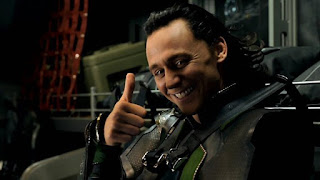That's not because I've been severely absent from my blog since 2019, but because I figured the Planet of the Apes reboots had ended seven years ago with a conclusion that was pretty solid and pretty final. The main protagonist of those reboots had died after all, and the last film had set things up in a way that could easily bring us full circle back to the events of the original 1968 film. What else could there be to cover?
Well, in the spirit of its subject matter, this franchise just showed us again that evolution is a never-ending process. As long as humans and hyper-intelligent apes share a planet, they'll keep finding newer and bigger problems to have with each other — and for screenwriters to write about.
And that's what's so interesting about these reboots: each installment jumps years ahead of the previous one to show us a new stage in the apes' history, so we get to see exactly how they and their problems are evolving. It also gives us the chance to explore a lot of the same themes and ideas from new perspectives since the power dynamics between humans and apes keep shifting. This latest film, Kingdom of the Planet of the Apes, actually has a fairly similar plot to War for the Planet of the Apes, except that the delusional villains who enslave the hero's people this time are other apes and we get a character who's sort of a human version of Koba.Speaking of characters from the first three films, Caesar, Maurice, Rocket, and a few others have cameos in Kingdom's prologue, but that's it. This film is both a sequel and a soft reboot that jumps ahead "many generations later" to give us a new cast of characters, including a new chimp protagonist named Noa. I'm assuming the writers gave him that name as an allegory since he literally has to save his people from a flood at one point in the film.
We get tons of new world-building this time around. We get a new orangutan character who also steals the show. We get our first mention of gibbons in the whole franchise. We even get a surprise appearance from William H. Macy for some reason, although no casting choice in this series will ever be as much of a head-scratcher as Kris Kristofferson in the Tim Burton film. And of course, we get lots of action, lots of nods to the original film, and even more of what's still some of the best character CGI put to film. All in all, Kingdom is a fun ride.
So how does it fair as a Planet of the Apes film?
As I mentioned before, this installment treads new ground by giving us a large-scale ape vs. ape conflict and also seeming to play with a few allegories. The main villain is an ape who goes by the name Proximus Caesar, a cult leader/dictator whose goal is to advance ape-kind into the planet's dominant race by forcing humans to share the secrets of their history and technology. He's presumably done his research on the name Caesar, since he often references the Roman Empire, but his preachings on the values of Caesar the ape are either sorely mistaken or deliberately twisted in order to brainwash his followers and serve his own corrupt agenda. There's some obvious social, political, and religious commentary there, with Caesar the ape even having become a savior-like figure in the eyes of the current ape clans. Just like its predecessors though, Kingdom handles this commentary with a subtle enough hand to avoid the traps that a lot of other movies fall into these days. The same goes for the human side of the conflict. Kingdom gives us a strong female character done right in the form of Mae, a teenage girl who manages to stay engaging and somewhat sympathetic throughout the plot even as her deception and prejudice against the apes slowly reveals itself. She's not doing what she does to be evil, she's doing it because her world has been shattered by the apes and she hasn't seen enough of their good side to accept that there are shades of gray in the struggle around her. Again, obvious commentary that's handled well. What's more, the movie ends her arc on a note that seems to suggest further development from her character if she returns in any sequels.I will say though that Kingdom is probably still the weakest of the Apes reboots. Noa isn't as compelling of a protagonist as Caesar, the supporting ape characters (aside from Raka the orangutan) aren't as memorable as the ones from the previous films, and the pacing could stand to speed up in many places. Still, calling a film the weakest entry in this series is like saying The Two Towers is the weakest Lord of the Rings film. It's still something to be proud of.
As a minor nitpick though, if it's even canon, the Planet of the Apes Wiki claims that Proximus is a bonobo just like Koba. Why keep making bonobos the bad guys? They're way less aggressive than common chimpanzees and way more endangered. And could this series please give us a gorilla character who doesn't get killed off? They've been through enough!
All in all, it's nice to make my own return of sorts alongside Planet of the Apes. I don't know how long we'll have to wait for the next installment, or if any more will come after this, but like the titular apes, I've seen enough strength and evolution along the way to be hopeful for the future.
And remember: if you ever tell Maurice the orangutan that gingers have no souls, he'll simply steal yours.

















